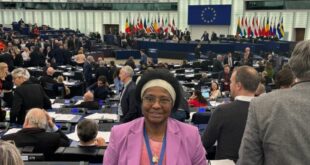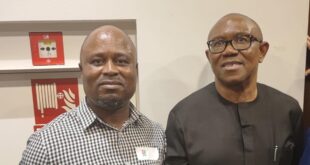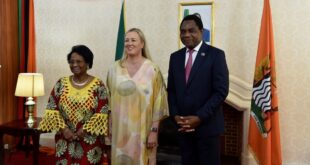There’s a first time for everything – even in a 155-year-old organization like Germany’s Social Democrats. They just voted in their first-ever female leader, Andrea Nahles.
Germany’s centre-left Social Democrats on Sunday elected Andrea Nahles, a combative and outspoken former labour minister, as the first woman leader of the 155-year-old party.
A decades-long SPD stalwart known for her lectern-thumping speeches, the 47-year-old single mother joins Chancellor Angela Merkel at the top of German politics — and as the woman who may one day seek her job.
“Today, at this party congress, we’re breaking though the glass ceiling in the SPD,” said Nahles at the meeting in the city of Wiesbaden. “And the ceiling will stay open.”
Well-connected within her party, Nahles, a former leader of its Jusos youth wing, won 66 percent of the vote, beating Simone Lange, 41, a former policewoman and mayor of the city of Flensburg.
The less than stellar result reflected lingering resentment within the party against the decision, strongly promoted by Nahles, to once more govern as junior partners to Merkel’s conservatives.
Electing a female SPD leader is “a sign of progress that was long overdue, and it’s good that it’s happening now,” said the party’s outgoing interim leader, Finance Minister Olaf Scholz, who called the vote “a historic moment”.
Nahles, a bricklayer’s daughter who hails from the party’s left wing, vowed to lead a renewal of Germany’s second biggest party, which scored just 20.5 percent in the September 2017 general election — its worst post-war result.
The SPD’s challenge now will be to at once govern responsibly as junior coalition partners, while also convincing its dwindling band of working-class voters that it is still fighting for their interests.
Nahles vowed that the SPD would fight for social justice and welfare, declaring that “solidarity is what is most lacking in the globalised, neoliberal, turbo-digitalised world”.
She pledged to promote decent wages as technology destroys traditional jobs, and a pro-EU foreign policy that also emphasises pacifism, diplomacy and international cooperation.
In her speech Sunday, Nahles also vowed a determined fight against rightwing populists of the Alternative for Germany (AfD), declaring that the battle “is about nothing less than preserving our democracy”.
For now, Nahles faces a huge challenge ahead — a survey last week found that 47 percent of respondents doubted that the party veteran is the right person to lead a renewal.
Only one third had confidence that Nahles would be able to strengthen the party, said the poll by Infratest dimap for public broadcaster ARD.
© AFP
 THE AFRICAN COURIER. Reporting Africa and its Diaspora! The African Courier is an international magazine published in Germany to report on Africa and the Diaspora African experience. The first issue of the bimonthly magazine appeared on the newsstands on 15 February 1998. The African Courier is a communication forum for European-African political, economic and cultural exchanges, and a voice for Africa in Europe.
THE AFRICAN COURIER. Reporting Africa and its Diaspora! The African Courier is an international magazine published in Germany to report on Africa and the Diaspora African experience. The first issue of the bimonthly magazine appeared on the newsstands on 15 February 1998. The African Courier is a communication forum for European-African political, economic and cultural exchanges, and a voice for Africa in Europe.

































